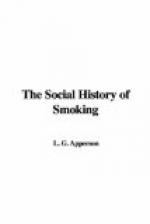Undergraduates, like men of letters, did not pay much attention to the conventional attitude of society towards tobacco, and pipes maintained their popularity in college rooms. Thackeray, in the “Book of Snobs,” describes youths at a University wine-party as “drinking bad wines, telling bad stories, singing bad songs over and over again. Milk punch—smoking—ghastly headache—frightful spectacle of dessert-table next morning, and smell of tobacco.” But the satirist is often tempted to be epigrammatic at the expense of accuracy, and this picture is at least too highly coloured. In the recently published memoir of “J”—John Willis Clark—some reminiscences of the late Registrary are included; and “J” does not recognize Thackeray’s picture as quite true of the “wines” of his undergraduate day, i.e. about 1850. “They may,” he says, “have ‘told bad stories and sung bad songs,’ as Thackeray says in his ‘Book of Snobs.’ I can only say that I never heard either the one or the other.” But certainly there was noise, and there was smoke—plenty of it. “Conversation there was none,” says “J,” “only a noise. Then came smoke. In a short time the atmosphere became dense, the dessert and the wine came to an end, and it was chapel time (mercifully).” One story Clark tells of an extraordinary attempt to smoke. Referring to the compulsory “chapels,” he says that as a rule everybody behaved with propriety, whether they regarded the attendance as irksome or otherwise. But, he admits, “’Iniquity Corner,’ as the space at the east end on each side of the altar was called, may occasionally have effectually sheltered card-playing; but when a young snob went so far as to light a cigar there, he had the pleasure of finishing it in the country, for he was rusticated. It was on a cognate occasion in Jesus College, in which cobblers’ wax played a prominent part, that Dr. Corrie dismissed the culprit, after a severe lecture, with these admirable words: ’Your conduct, sir, is what a Christian would call profane, and a gentleman vulgar.’”
At Oxford, in November 1859, the Vice-Chancellor and Proctors issued the following notice, which shows that an occasional outbreak of bad manners might happen on the Isis as on the Cam: “Whereas complaints have been made that some Undergraduate members of the University are in the habit of smoking at public entertainments, and otherwise creating annoyance, they are hereby cautioned against the repetition of such ungentlemanlike conduct.”
There was plenty of smoking among undergraduates at Oxford in those days, as may be seen in such books as “The Adventures of Mr. Verdant Green,” and Hughes’s “Tom Brown at Oxford,” both of which date from 1861. When Tom, after a reading-bout, thought of going out—“there was a wine party at one of his acquaintance’s rooms; or he could go and smoke a cigar in the pool-room, or at any one of a dozen other places.” Cigars were the fashionable form of smoke. When Tom offers his box to Captain Hardy, that worthy’s son says: “You might as well give him a glass of absinthe. He is churchwarden at home, and can’t smoke anything but a long clay,” with which the old sailor was accordingly supplied.




